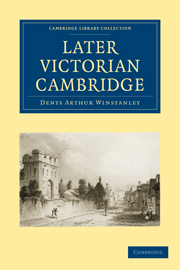Book contents
- Frontmatter
- D.A.W. A Memorial Note
- Contents
- PREFACE
- Chapter I ROBINSON'S VOTE
- Chapter II THE JUDGES AND TRINITY COLLEGE
- Chapter III THE RELIGIOUS TESTS (1862–1871)
- Chapter IV THE CAMBRIDGE UNIVERSITY AND CORPORATION ACT
- Chapter V EDUCATIONAL REFORM (1860–1880)
- Chapter VI THE TRINITY REFORMERS
- Chapter VII THE STATUTORY COMMISSIONERS AND THE UNIVERSITY
- Chapter VIII THE STATUTORY COMMISSIONERS AND THE COLLEGES
- Index
Chapter I - ROBINSON'S VOTE
Published online by Cambridge University Press: 07 September 2010
- Frontmatter
- D.A.W. A Memorial Note
- Contents
- PREFACE
- Chapter I ROBINSON'S VOTE
- Chapter II THE JUDGES AND TRINITY COLLEGE
- Chapter III THE RELIGIOUS TESTS (1862–1871)
- Chapter IV THE CAMBRIDGE UNIVERSITY AND CORPORATION ACT
- Chapter V EDUCATIONAL REFORM (1860–1880)
- Chapter VI THE TRINITY REFORMERS
- Chapter VII THE STATUTORY COMMISSIONERS AND THE UNIVERSITY
- Chapter VIII THE STATUTORY COMMISSIONERS AND THE COLLEGES
- Index
Summary
In January 1861 Dr Philpott, who had been Master of St Catharine's College for fifteen years, was nominated for election to the See of Worcester, and as he did not resign the mastership until the following September, the candidates for that office had plenty of time to weigh their chances and develop their plans. It seems to have been generally assumed that as the Senior Fellow, Joseph Milner, did not intend to stand for election, the prize would fall to one of the two Fellows next in order of seniority, Charles Kirkby Robinson and Francis James Jameson, though the claims of one of the ex-Fellows, Ralph Blakelock, may have been considered.
Robinson could reasonably hope to succeed Dr Philpott in the mastership. He was senior to Jameson on the roll of Fellows, and moreover a St Catharine's man, which Jameson was not; and as Bursar of the college he had acquired considerable knowledge of its affairs. Yet, as he was possibly aware, he might not be personally acceptable to the Society. Though a kindly man, and much admired in evangelical circles for his piety and pulpit eloquence, he was reserved, secretive and had a somewhat furtive manner; and consequently was thought by some of his colleagues to be rather sly and underhand. Jameson was a far more popular character. He was frank and generously minded, fond of his friends and disposed to think the best of them; and though a migrant from another college, it was by no means unlikely that a majority of the Fellows of St Catharine's would prefer him to Robinson as their Master.
- Type
- Chapter
- Information
- Later Victorian Cambridge , pp. 1 - 19Publisher: Cambridge University PressPrint publication year: 2009First published in: 1947

